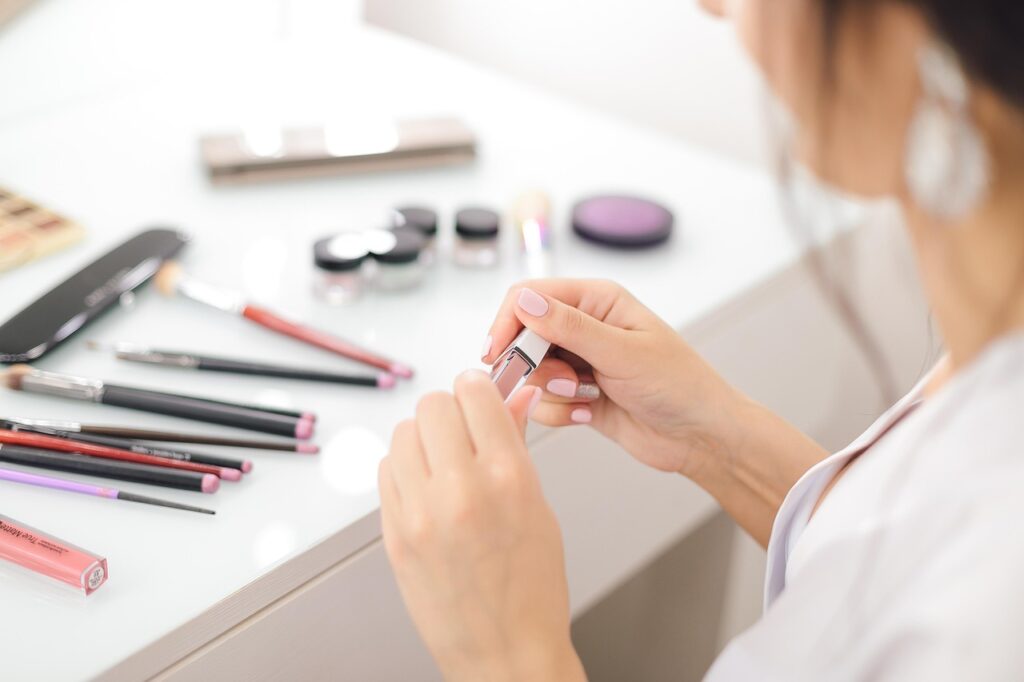Ever wonder if your beauty routine is making you sick — or why you feel worse after wearing makeup, even for a short time?
If you’re living with chronic illnesses like MCS (Multiple Chemical Sensitivity), Fibromyalgia, Chronic Fatigue Syndrome, or PTSD, you’re probably already sensitive to products other people seem to tolerate just fine. But even if you’re not reacting with obvious symptoms, many conventional makeup products are silently disrupting your hormones, immune system, and nervous system.
And I’ve felt it firsthand.
How My Makeup Made Me Sick (Before I Knew Why)
Years ago, I couldn’t figure out why my migraines and fatigue would spike after a day out. I blamed stress. Or sleep. Or maybe food. But eventually, I started noticing a pattern: every time I wore makeup, I crashed. My face itched, my energy plummeted, and my brain felt foggy.
When I looked into the ingredients… I was shocked.
The Hormone-Disrupting Chemicals Hiding in Your Makeup Bag
Here are just a few common ingredients in conventional cosmetics and why they’re harmful — especially if you’re already dealing with chronic illness:
- Phthalates (often hidden under “fragrance”):
Disrupt estrogen, testosterone, and thyroid function. Linked to infertility, fatigue, and immune suppression. - Parabens (methylparaben, propylparaben, etc.):
Mimic estrogen and may increase risk of breast cancer and hormone imbalance. Known endocrine disruptors. - Fragrance / Parfum:
A vague term hiding hundreds of chemicals — many of which are known allergens, irritants, or hormone disruptors. - Talc:
Often contaminated with asbestos unless it’s third-party tested. Can trigger respiratory symptoms or worse in sensitive individuals. - Heavy Metals (like lead or cadmium, especially in lipstick and eyeliner):
Bioaccumulate over time and can cause neurological issues, hormone problems, and immune dysfunction. - Ethoxylated ingredients (look for words like PEG, polysorbates, or anything ending in “-eth”):
These can contain 1,4-dioxane — a probable human carcinogen and skin irritant.
For more on how these ingredients affect your hormones, check out this breakdown from the Environmental Working Group (EWG).
Why This Matters for Chronic Illness (Especially MCS, Fibro, PTSD & More)
If you’re dealing with MCS, Fibro, PTSD, or FCS, your body is already in hyper-reactive survival mode. These illnesses often come with nervous system dysregulation, immune dysfunction, and a burdened detox system.
That means:
- Small exposures = big consequences.
- Your body may not be able to detox like it used to.
- Hormone-disrupting ingredients can make symptoms worse — even days later.
And for those with PTSD, studies show a heightened stress response to environmental toxins, which means even mild exposures can trigger major flare-ups.
So, What’s the Alternative?
Clean beauty isn’t just a trend — it’s a lifeline.
Switching to truly non-toxic makeup made a huge difference for me. Not perfect. But better. I no longer crash after putting on mascara. I can wear lipstick without triggering a migraine.
Some great brands to explore (I’m not affiliated with any of them):
Want help reading labels? I use the Think Dirty app and Bobby Approved to scan ingredients and get instant insight on toxicity ratings.
Bottom Line
If your makeup is making you feel worse — you’re not crazy. You’re not vain. You’re not overreacting. You’re reacting appropriately to a toxic load your body is trying to fight off.
You deserve products that don’t poison you.
You deserve to feel good in your skin — without sacrificing your health to fit in.
Related Reading
- Toxic Ice Cream Ingredients to Avoid (for MCS, Gut Health & Inflammation)
- Scents Make Me Sick: What It’s Like to Have MCS
- Spreading Awareness Of Invisible Illness




